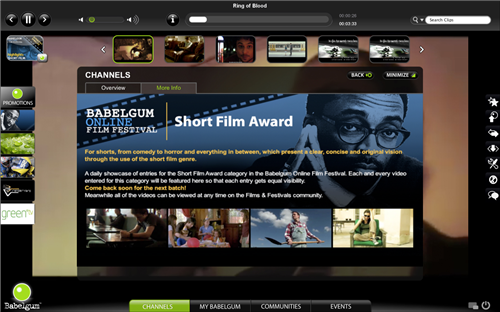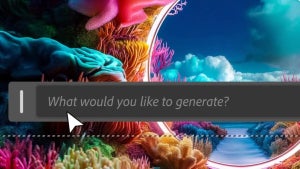After hearing the news that Babelgum will invest €10m in new productions, mostly shorts and documentaries, we wanted to find out more about where online television is heading, and what we can expect from it. We spoke to Valerio Zingarelli, Babelgum CEO, to ask him about what’s going on in the market. He let us know the company’s views on their current content strategy, the future of web TV and the low-down on their revenue-share system, as well as responding to some criticism in the blogosphere.

It is in the news that Babelgum will invest €10m into independent film production. Could you tell us where your company is heading and why it is independent film worth investing in?
Babelgum remains primarily a web distribution platform for non exclusive “long-tail” content; a platform that allows professionals to showcase and monetize safely and instantly their content, bypassing today’s distribution bottlenecks. The self produced content will always represent a small minority of all our content on offer (1%). The reasons why we are dedicating a budget to develop also our own productions are:
1) As Spike Lee put it, Babelgum’s mission is to nurture young talent;
2) Having exclusive self produced content is part of – I would say – every good content strategy. It helps to attract users in those areas where Babelgum wants to become a point of reference: indie films and Nature.
Where is internet TV going? Do you think it can be a competitor with traditional television?
Web TV is a new offering that is inherently different to traditional broadcasting. Traditional TV is broadcast to the masses, with mass appeal and it will continue to offer this kind of live, and typically social, programming. Web TV on the other hand, is an individual experience and although communities exist online, these tend to appeal to people with similar interests.
Many of the mainstream commercial broadcasters are already offering ‘catch up’ services which are doing an excellent job of re-showing that existing premium content, on demand, over the Internet. It is our view therefore that with Hulu and others scheduled to launch, it will be some time before traditional broadcasters change their focus from these platforms. Indeed Babelgum is designed to complement content available for consumption on mainstream TV, rather than replacing it.
The web has been stealing ‘eyeball’ time from the TV for some years now and that’s one of the reasons the traditional broadcasters are already participating in the sector with varying degrees of success. In the longer term the web is likely to be able to offer the quality and reliability of traditional broadcasting and all of those factors are leading to changes in the fundamental balance of power shifting away from the ‘gatekeeper’ broadcaster. Viewers in the Web TV world will be offered almost unlimited options and direct access to content. It’s a compelling prospect and one which the traditional broadcasters will find difficult to prevent.
A company cannot live without income and for commercial broadcasters this comes from highly paid advertising campaigns. What’s your business model?
Babelgum is free to view for users and paid for by advertising. The model is: 50:50 revenue share between rights owners and Babelgum. Rights owner can distribute their own advertising or let Babelgum collect it. Based on this open paradigm, advertising revenue share may vary a little bit from the standard 50:50.
For Premium content, Babelgum can offer a license fee guarantee which is recoverable from first advertising revenues. Once recovered, the parties move to advertising share model.
For content unable to attract (or unfit for) advertising, Babelgum offers $5.00 minimum guaranteed for each 1,000 unique views.
You’re one of several providers in a crowded market. What differentiates you from other services like Joost or Hulu?
Both Babelgum and Joost use the same basic peer to peer (P2P) streaming technology to deliver TV quality video and audio over the Internet and both require users to download a small ‘client’ application to view the available library of content. Where Babelgum differs is that it has no wish to replicate mainstream broadcast television in terms of content. Babelgum has a firm focus on promoting niche content to niche audiences. It is therefore creating a new kind of interactive video portal that brings together professional niche content from around the world and delivers it to communities with similar interests.
Babelgum is one of the very few independent platforms in the market today. Two major American studios (Viacom and CBS) have become shareholders of Joost, and big names such as Google and News Corporation are behind YouTube and My Space. Babelgum is committed to pursuing its mission to create a new, significant distribution channel for high quality independent video productions. Hulu: they are focusing on mainstream content.
How do you respond to criticisms on NewTeeVee concerning the limitations of your content model, particularly the non-US, environmental, episodic focus?
Our self produced content will already be conceived for the Internet and in about 15 min. long formats (because this is what we consider the more or less the average viewing time for a service like Babelgum). It’s probably to early to say whether Babelgum will be willing to then sell all this to traditional broadcasters. I imagine the company will want to monetize these assets as best as it can. To me it doesn’t seem an insoluble problem to put together two or three 15 minutes episodes and transform them into a longer format for traditional TV.
Earth2Tech is a very popular blog, but certainly not the only one (i.e. Treehugger). Babelgum wants to create a community around professional video content that supports a conservationist idea of Nature. To me they are very different things.
Babelgum aims to be a global distribution platform tailored not just on the US viewer habits and tastes. Having said that we certainly want these original self produced contents to be as interesting and attractive as possible also for the American audience.

